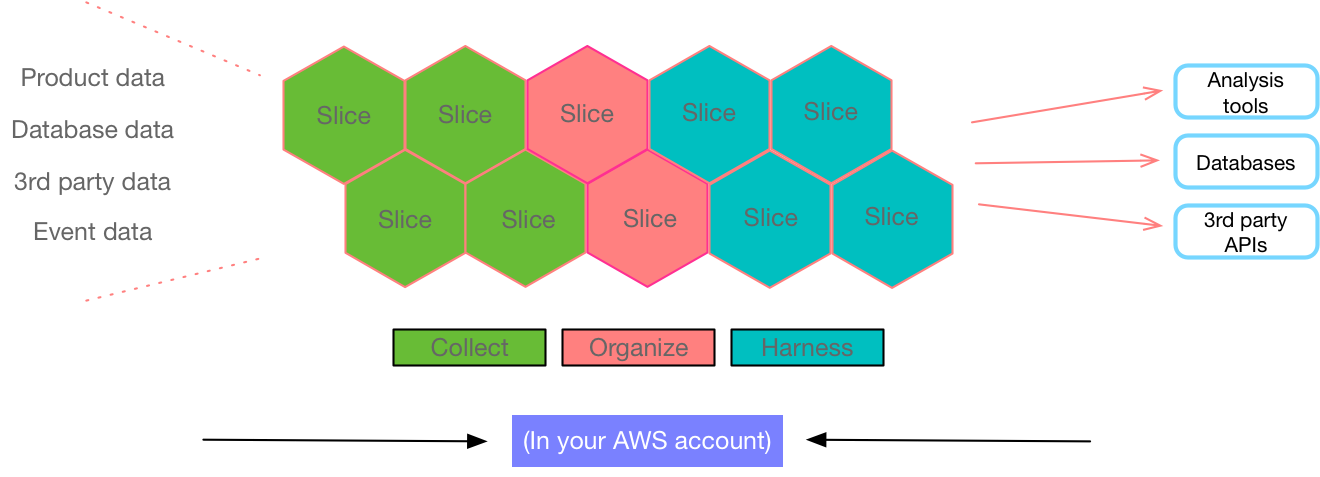Today's companies aim to be data-driven, but data infrastructure is time intensive and costly to build, maintain, and secure. A coral is the exoskeleton of a small marine animal that attaches and grows on almost anything. Once it starts growing, it can create large reefs, which support a diverse ecosystem of plants and animals. So what happens if you apply that philosophy to the world of data?
Article Highlights
- Let your team focus on building data products instead of data pipelines. Utilize fully managed microservices architectures to collect, organize and harness the power of your organization's data.
- Aim to spend less time worrying about your data infrastructure and more time interacting directly with the meaning of your data to learn new insights.
- Datacoral’s unique ‘Slices’ concept provides building blocks for your own custom data infrastructure, which combines data engineering and data operations into a single interface.
In today’s world, it is particularly challenging to build a data infrastructure stack that best leverages all available cloud services. In my personal experience, I’ve discovered that companies spend too much time building, tuning and troubleshooting their data infrastructure rather than doing amazing things with the data itself. Datacoral, a participant and sponsor of DataEngConf NYC ‘18, is utilizing the event to publically launch their data infrastructure as a service platform, and commercially offer their rich data-infrastructure ecosystem to support data-driven enterprises.
Raghu Murthy, the founder & CEO of Datacoral, will be presenting a talk at the event titled “Analyzing Data in the Cloud: Are True Privacy and Security Possible?” Raghu previously worked at Yahoo! and Facebook to build their data infrastructure, and helped scale Facebook’s data infrastructure from 50 TB (@100M users) to over 100 PB (@1.15B users).
Datacoral offers a fully-managed data-infrastructure-as-a-service with a set of functional building blocks called ‘Slices.’ Slices are a revolutionary new way to think about functional units companies can utilize to develop their data pipelines and ETL systems. First Datacoral introduces 1) “Collect Slices” that source data from anywhere, next 2) “Organize Slices” process the data in any query engine, and finally 3) “Harness Slices” that publish insights to various systems or to other operations. These building blocks are easy to assemble programmatically or via the CLI. Data integrity and data freshness can be monitored easily through a web dashboard.

The company enables companies to easily design and manage their own custom data infrastructure stack, so they’re able to focus more on building data-driven product rather than maintaining the pipes. Customers simply choose and configure the Slices they need and Datacoral provides a secure and fully managed data infrastructure stack with only those functionalities.
Perhaps most importantly for enterprise use cases, Datacoral’s Slices live inside the customer’s own VPC (Virtual Private Cloud). This means that data security is retained by the customer, and encrypted with their own encryption keys. Datacoral ensures that the customer’s data never leaves their own private cloud.
The architecture is also based on serverless technologies, like AWS Lambda, which enable seamless scaling of infrastructure resources. Datacoral's product gives customers complete control over their data and a level of security that is typically only found with infrastructure that is managed in-house .
With Datacoral, teams are empowered to do more with the data they are collecting and worry less about the underlying data infrastructure itself. Utilizing the latest cloud architecture paradigms and serverless computing, Datacoral can help your data team focus on delivering value through your data insights and models.
.webp?width=250&height=78&name=DC-Logo%20Type_%20Invert(1).webp)


(1).jpg?width=1920&name=Pano2(1)(1).jpg)